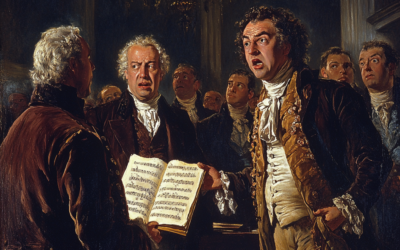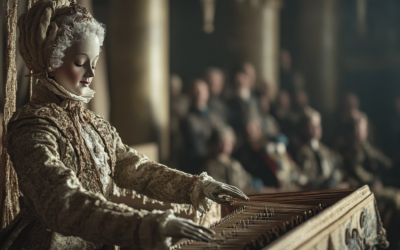The London Notebook and the Vienna Disaster
Exposing the Myths of Mozart’s Early Years
The romanticised image of young Wolfgang Amadeus Mozart as a flawless composer and virtuosic improviser crumbles when examined through historical evidence. His London Notebook, often hailed as proof of his precocious genius, is riddled with errors, awkward harmonies, and simplistic exercises likely devised by his father. Far from the divine prodigy of legend, Mozart struggled with composition, particularly with fugues, well into his teenage years. Later, in Vienna, Leopold’s relentless ambition led to the ill-fated attempt to establish Wolfgang as an opera composer at just twelve years old. The fiasco of La Finta semplice exposed what many already suspected: Wolfgang was not composing alone, and the hand of Leopold was all too evident in his work.
From Improvisation Exercises to Operatic Failure: The Reality Behind the Mozart Legend
The London Notebook: A Shaky Foundation
By 1764, the Mozart family had arrived in London, where Leopold sought to cement his son’s reputation among England’s aristocracy. However, when Leopold fell seriously ill that summer, Wolfgang and Nannerl were unable to perform for nearly two months. It was during this period that the so-called London Notebook was compiled—forty-three short keyboard pieces, traditionally attributed to Wolfgang.
A closer look at this collection, however, raises serious doubts about the myth of the young composer’s infallibility. The pieces are riddled with structural weaknesses: parallel octaves and fifths, false relations, and clumsy melodic doubling of the bass. These are not the works of a musical deity effortlessly transcribing perfect compositions from the heavens but of a child struggling with the very basics of counterpoint.
What does this tell us? First, that Leopold Mozart, who had controlled every aspect of Wolfgang’s musical development, was still guiding and correcting his work. Second, that improvisation—the skill Wolfgang was famed for in Paris and London—was not the spontaneous act of divine inspiration that his admirers believed. Rather, it was a structured practice, built upon pre-learned patterns, designed to impress audiences unfamiliar with true compositional depth.
The Fugues He Couldn’t Write
One particular piece in the London Notebook stands out—a fugue that Wolfgang begins but is unable to complete. This is revealing. If, at eight years old, he was struggling with fugues, how could he have successfully improvised one in front of the King of England, as later biographers claimed?
The problem persisted. In 1766, two years later, Wolfgang’s Gallimathias musicum K.32 featured a fugue that, once again, he could not finish. His father had to complete it for him. The legend of young Mozart spontaneously dazzling audiences with complex counterpoint collapses under this simple fact: he had not yet mastered the skill. If, as musicologists like Abert have suggested, Wolfgang only learned how to write fugues properly in Florence under the guidance of Ligniville at age 14, then the entire tale of the prodigy improvising fugues in London is pure fiction.
“Everyone in Vienna," Leopold lamented in a letter, "complained that young Mozart was unable to compose the opera, or that the material was so poor it couldn't be performed, or that it was the father, not the son, who had written the music."
Leopold Mozart
The Vienna Disaster: When the Myth Was Challenged
By 1768, Wolfgang was no longer the tiny child prodigy capable of astonishing crowds simply by being young. At twelve years old, his stature still allowed him to appear younger than he was, but the novelty was wearing off. Leopold needed a new spectacle to maintain their momentum. His solution? Transform Wolfgang from an extraordinary harpsichordist into a composer of full-scale Italian opera.
Vienna was chosen as the stage for this new phase of Wolfgang’s career, and the opera La Finta semplice K.51 was meant to be his grand debut. However, from the very beginning, things went disastrously wrong.
A Child’s Work… or a Father’s?
Viennese musicians and impresarios quickly began to suspect that La Finta semplice was not Wolfgang’s work at all. Rumours spread that the opera had been composed by Leopold rather than his son, and that Wolfgang simply wasn’t capable of writing an entire opera on his own. Even worse, those who examined the score found that it did not match the standard expected of a professional opera composer—awkward phrasing, grammatical errors in the Italian text, and music that seemed clumsy and uninspired.
Leopold fought desperately to silence these accusations, but he could not escape the scepticism of those who saw through his carefully crafted illusion. Even the impresario overseeing the production, Giuseppe Afflisio, refused to stage the opera. Ironically, Afflisio himself had a reputation as a swindler, but he had little trouble identifying another deception when he saw one. He recognised that the opera was unlikely to succeed and that the Mozart name alone was not enough to guarantee success.
A Failed Opera, A Shattered Illusion
What remains of La Finta semplice today is the result of numerous revisions, extensive reworking at the harpsichord, and countless edits—evidence that the opera was not a spontaneous masterpiece but a laborious effort, likely involving both father and son. If this revised version is the one that survives, one can only imagine the state of the opera when it was first presented to the Viennese singers and musicians.
The professionals who encountered La Finta semplice were not impressed. The most telling sign of its failure is that it was never performed in Vienna. Despite Leopold’s best efforts, the opera was ultimately abandoned, and the Mozarts left the city in defeat.
“Everyone in Vienna,” Leopold lamented in a letter, “complained that young Mozart was unable to compose the opera, or that the material was so poor it couldn’t be performed, or that it was the father, not the son, who had written the music.”
The Vienna disaster was a turning point. For the first time, Leopold’s narrative of his son’s infallible genius had been publicly challenged. The idea that Wolfgang was composing entirely on his own was now in serious doubt, and those in Vienna had seen firsthand that the legend did not match reality.
Conclusion: The Making of a Myth
The London Notebook and the Vienna disaster expose the stark difference between the Mozart legend and the historical truth. Rather than an infallible musical prodigy, young Wolfgang was a talented but developing musician, guided by a father who was determined to shape his son’s reputation—sometimes through deception, embellishment, and outright forgery.
Far from composing with effortless brilliance, Mozart struggled with fugues well into his teenage years. Far from being a child opera genius, his first operatic attempt ended in failure and scepticism. These are not the signs of a divine prodigy but of a young musician whose talent was still being moulded—one whose achievements were as much the work of his father as his own.
For more revelations on the Mozart family’s hidden history, read Mozart in Italy—a groundbreaking investigation into the myths and realities behind one of history’s most manipulated musical figures.
📖 Mozart in Italy: Available now!
You May Also Like
When the Myth Collapsed
Vienna exposed the myth: La Finta semplice was riddled with errors, and Wolfgang’s supposed opera genius was nothing more than Leopold’s fabrication. With their reputation in ruins, father and son turned to Italy, hoping to rewrite history.
Versailles, Vanity, and the Pursuit of Prestige
Leopold Mozart’s letters transformed his son’s European tour into a carefully staged fantasy—filled with exaggerated encounters, fabricated royal admiration, and a relentless pursuit of social prestige. But how much of it was real?
The Fabricated Childhood of Mozart
The legend of young Mozart’s divine genius crumbles under scrutiny, revealing a childhood dictated by Leopold’s ambition, carefully constructed myths, and a relentless pursuit of fame at the expense of genuine artistic education.
The Man Behind the Myth
Leopold Mozart’s legacy has been shaped by myths and hagiographies, but his letters reveal a man more concerned with financial gain and self-promotion than artistic integrity. Was he truly a devoted father, or simply an opportunist?
Constanze vs. The Catholic Church
For over two centuries, scholars have debated the circumstances surrounding Mozart’s burial. Constanze Mozart’s supposed inability to mark his grave, the confrontation with the Catholic Church over funeral masses, and the baffling disappearance of Mozart’s body all contribute to a mystery stranger than fiction. Did a powerful group keep her silent? And what really happened to Mozart’s remains?
Constanze Mozart’s Enduring Love
Although some have doubted her devotion, Constanze’s own words and actions illustrate a widow deeply committed to preserving Mozart’s legacy. Diaries, personal correspondence, and eyewitness testimony all challenge the notion that she neglected his memory—while the circumstances around his burial grow ever more perplexing.







